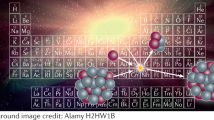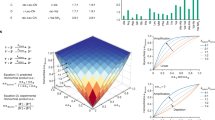Abstract
It has long been known that Earth's biochemistry is overwhelmingly dissymmetric or chiral1–4. In model chemical systems5–7 that spontaneously evolve to a state dominated by either the L or the D enantiomer, parity violation in β-decay and that attributable to weak neutral currents (WNC) in molecules8,9 is thought to be too small to have any significant influence on the emergent chirality10,11. Other conceivable systematic chiral influences are generally even weaker12–14. We show here that there is a simple and extremely sensitive mechanism by which a minute but systematic chiral interaction, no stronger than the WNC interaction in amino acids, can, over a period of ∼15,000 yr, determine which enantiomer will dominate. Such a mechanism is especially interesting when considering the origins of terrestrial biochemistry, particularly in view of the work by Mason and Tranter15, who found that it is the terrestrially dominant L amino acids that are favoured by the WNC interaction.
This is a preview of subscription content, access via your institution
Access options
Subscribe to this journal
Receive 51 print issues and online access
$199.00 per year
only $3.90 per issue
Buy this article
- Purchase on Springer Link
- Instant access to full article PDF
Prices may be subject to local taxes which are calculated during checkout
Similar content being viewed by others
References
Mason, S. F. Int. Rev. phys. Chem. 3, 217–241 (1983); Nature 311, 19–23 (1984).
Elias, W. E. J. chem. Educ. 49, 448–454 (1972).
Miller, S. W. & Orgel, L. E. The Origin of Life on Earth (Prentice-Hall, New Jersey, 1974).
Fox, S. W. & Dose, K. Molecular Evolution and the Origin of Life (Dekker, New York, 1977).
Frank, F. C. Biochim. biophys. Acta 11, 459–463 (1953).
Seelig, F. F. J. theor. Biol. 31, 335–361 (1971).
Decker, P. J. molec. Evol. 4, 49–65 (1974).
Zel'dovich, Ya. B., Saakyan, D. B. & Sobel'man, I. I. Pis'ma Zh. eksp. teor. Fiz. 25, 106–109 (1977) (J. exp. theor. phys. Lett. 25, 94–98].
Hegstrom, R. A., Rein, D. W. & Sandars, P. G. H. J. chem. Phys. 73, 2329–41 (1980).
Thiemann, W. (ed.) Origins Life 11, 1–194 (1981).
Keszthelyi, L. Origins Life 14, 375–382 (1984).
Mead, C. A. & Moscowitz, A. J. Am. chem. Soc. 102, 7301–7302 (1980).
Peres, A. J. Am. chem. Soc. 102, 7389–7390 (1980).
Kondepudi, D. K. & Nelson, G. W. Physica 125A, 465–496 (1984).
Mason, S. F. & Tranter, G. E. JCS chem. Commun., 117–119 (1983); Molec. Phys. 53, 1091–1111 (1984).
Kondepudi, D. K. & Nelson, G. W. Phys. Rev. Lett. 50, 1023–1026 (1983).
Kondepudi, D. K. & Prigogine, I. Physica 107A 1 (1981).
Sattinger, D. H. Lecture Notes in Mathematics No. 762 (Springer, Berlin, 1979).
Mangel, M. J. chem. Phys. 69, 3697–3708 (1978).
Keizer, J. J. chem. Phys. 69, 2609–2620 (1978).
Kondepudi, D. K. in Fluctuations and Sensitivity in Nonequilibrium Systems (eds Horsthemke, W. & Kondepudi, D. K.) 204–213 (Springer, Berlin 1984).
Kondepudi, D. K. & Nelson, G. W. Phys. Lett. 106A, 203–206 (1984).
Mangel, M. Phys. Rev. A24, 3226–3238 (1981).
Morozov, L. L., Kuz'min, V. V. & Gol'danskii, V. I. Origins of Life 13, 69–101 (1983).
Morozov, L. L., Kuz'min, V. V. & Gol'danskii, V. I. Pis'ma Zh. exsp. teor. Fiz. 39, 344–345 (1984); JETP Lett. 39, 414–416 (1984).
Nicolis, G. & Prigogine, I. Self Organization in Nonequilibirum Systems (Wiley, New York, 1977).
Nicolis, G. & Malek-Mansour, M. Phys. Rev. A29, 2845–2853 (1984).
Nitzan, A., Ortoleva, P., Deutch, J. & Ross, J. J. chem. Phys. 61, 1056–1074 (1974).
Van Kampen, N. G. Stochastic Processes in Physics and Chemistry (North-Holland, Amsterdam, 1981).
Uhlenbeck, G. E. & Ornstein, L. S. Phys. Rev. 36, 824–841 (1930).
Kuhn, W. & Braun, F. Naturwissenchaften 17, 227–228 (1929).
Kagan, H. B. et al. Tetrahedron Lett. 27, 2479–2482 (1971).
Kagan, H. B., Balavoine, G. & Moradpour, A. J. molec. Evol. 4, 41–48 (1974).
Flores, J. J., Bonner, W. A. & Massey, G. A. J. Am. chem. Soc. 99, 3622–3624 (1977).
Angel, J. R. P., Illing, R. & Martin, P. G. Nature 238, 389–390 (1972).
Author information
Authors and Affiliations
Rights and permissions
About this article
Cite this article
Kondepudi, D., Nelson, G. Weak neutral currents and the origin of biomolecular chirality. Nature 314, 438–441 (1985). https://doi.org/10.1038/314438a0
Received:
Accepted:
Published:
Issue Date:
DOI: https://doi.org/10.1038/314438a0
This article is cited by
-
Magnetic Circular Dichroism in Archean Stratospheric Oxygen: Enantiomeric Excess of Amino Acids Produced in Volcanic Plumes
Origins of Life and Evolution of Biospheres (2023)
-
From Minerals to Simplest Living Matter: Life Origination Hydrate Theory
Acta Biotheoretica (2023)
-
Sequential Amplification of Amino Acid Enantiomeric Excess by Conglomerate and Racemic Compound: Plausible Prebiotic Route Towards Homochirality
Origins of Life and Evolution of Biospheres (2023)
-
Evolutionary Approach to Biological Homochirality
Origins of Life and Evolution of Biospheres (2022)
-
Spontaneous Emergence of Transient Chirality in Closed, Reversible Frank-like Deterministic Models
Origins of Life and Evolution of Biospheres (2022)
Comments
By submitting a comment you agree to abide by our Terms and Community Guidelines. If you find something abusive or that does not comply with our terms or guidelines please flag it as inappropriate.



